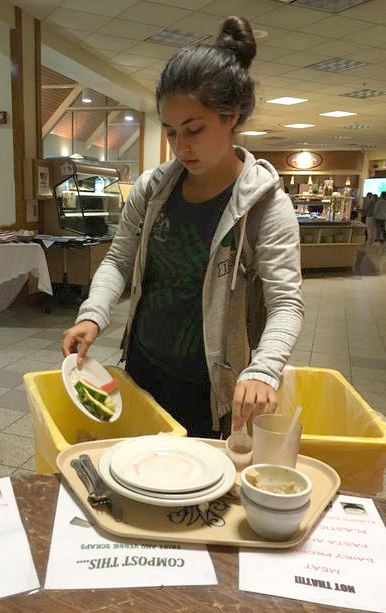Food Justice Through Compost and Recovery
Colleges and universities are an important part of the mission and vision to divert food waste from landfills, create healthy soils and mitigate climate change through composting, according to the US Composting Council’s website.
Saint Mary’s is heeding the call. Since the fall of 2017, the College has composted 39,702 pounds—nearly 20 tons—of food.
This year, through the dedication of a team of students known as the Food Waste Fighters, their composting collection is directly benefiting the first harvests of the College’s sustainable farm. 
“It’s a small but important step in reducing food waste,” said Yajali Rodriguez ’23, one of three student leaders in the program. Rodriguez, along with Akpedze Balo ’22, and Becca Stella ’22, enlists and trains volunteers to help with the program and ensure it runs smoothly.
In 2017, Valerie Stacey ’16 and Taylor TenBrock ’16 completed their capstone project on how composting minimizes the impact of waste on natural elements, enriches gardens, and contributes to a more sustainable ecosystem. They planned, tested, and implemented composting in the Noble Family Dining Hall. Since then, their research has grown into the Food Waste Fighter program with student volunteers who are managing it each year. It also includes food recovery and donations from the dining hall.
The Food Waste Fighters coordinate with the chefs from Campus Dining at Saint Mary's to package excess food for the Center for the Homeless in South Bend. Student volunteers deliver the food twice a week throughout the academic year. Since the program began, Saint Mary’s has donated 9,069 pounds of food to the center.
One future goal of the program is to extend the composting into residence halls to further help supply the farm with nutrient-rich soil.
“We want to expand even further,” Rodriguez said. “We’re thinking about a tri-campus system with Holy Cross College and Notre Dame, and reaching out to community organizations to offer support and help for setting up composting and food recovery,” she added.
Saint Mary’s has a long history of environmental stewardship as one of the core tenets of its Catholic Social Teaching.
“To be good stewards of the earth and its care is a natural animation of our identity as a Catholic institution because we are all called to care for our common home,” said Rebekah Go, director of the Office for the Common Good, which sponsors the program.
Food waste in particular has grieved Pope Francis, Go said. “He stated in his encyclical “Laudato Si” that whenever food is thrown out it is as if it were stolen from the table of the poor. So, composting along with food recovery, helps us think creatively on ways that we can reduce waste while caring for others and our earth.”
Along with sponsoring these programs, the Office for the Common Good also sponsored Food Justice Week November 8-13.
“It was born out of a desire to develop dialogue around our annual food drive. It's one thing for students, faculty, and staff to open their pantries and/or wallets to make a donation. It's another thing to think about how each of us in our daily lives can help alleviate food insecurity and food waste,” Go said.
The week includes a food drive, service projects, and opportunities for reflection and learning. “Our hope is that students, staff, and faculty will think about small changes they might make in their daily lives that collectively will make a big impact in our world,” she said.
Food Justice Week culminates with a service opportunity Saturday, November 13 for community partner Cultivate Culinary to learn more about composting and participate in the process.
To learn more or get involved, contact Rebekah Go at the Office for the Common Good.
